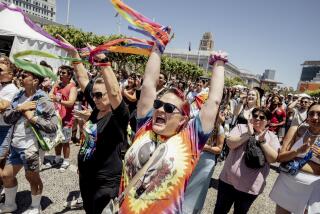Gay-Bashing Incidents Spread Even to Once-Tolerant Areas
- Share via
MINNEAPOLIS — When former Minnesota State Sen. John Chenoweth was shot to death early on Aug. 10, police and city officials knew their fears had been confirmed that this usually tolerant Midwestern city had come face-to-face with a form of violence infecting many urban areas.
Gay-bashing has been spreading.
“We are calling the last several months the long hot summer of anti-gay hate,” said Robert Bray, spokesman for the National Gay and Lesbian Task Force, in Washington.
BACKGROUND: Some of the national increase may be tied to better reporting of statistics and higher media interest, but that only explains part of it.
Recent assaults are part of a larger pattern that ranges from harassment to murder, according to the National Gay and Lesbian Task Force’s policy institute. In 1990, some 1,588 acts of violence were reported in six cities examined in a study, up 42% over 1989.
In Houston, banker Paul Broussard was bludgeoned to death July 4 while walking with friends in the city’s gay district. Ten suburban youths have been charged in his murder. The slaying prompted a police gay-violence decoy operation in which five police officers were assaulted.
In New York, the summer brought two more Central Park shootings, bringing the total to four within the park’s known gay turf. In July, 98 anti-gay or lesbian crimes were reported, the highest monthly total since the New York City Gay and Lesbian Anti-Violence Project began counting.
And in Minneapolis, where the former state senator was found slain on a secluded Mississippi River beach that is a popular hangout among gays, another man was shot in the back and abdomen at the same time, but survived.
Ten days earlier, a 21-year-old water bed salesman had been shot and killed in another well-known gay haunt--Loring Park, near the city center. Witnesses said they heard him yell, “You are not going to get my wallet,” and it appeared robbery may have been the motive.
But police now say the murders are connected. “There is a connection--I won’t say what it is,” said Minneapolis Police Chief John Laux, who assigned four homicide detectives to investigate.
Said Bray, “We are fighting an epidemic of hatred, harassment and homicide.”
Advocacy groups contend that statistics only begin to tell the story.
“We receive many times the numbers of complaints than is reported to all law enforcement agencies in Los Angeles County combined,” said Roger Coggan, director of legal services at the Los Angeles Gay and Lesbian Community Services Center. “And what we receive is really the tip of the iceberg.”
Groups across the country seem to blame the upswing in gay-bashing in part on the prominence of gays and lesbians themselves. “Part of the reason is the increased visibility and activism (of the gay and lesbian community),” said Matt Foreman, executive director of the New York City Gay and Lesbian Anti-Violence Project.
The Minneapolis murders threaten the city’s reputation as an island of tolerance. And Deputy Mayor Rip Rapson admits that not all the callers to City Hall have been sympathetic, with some contending “the gay and lesbian community is inviting this (violence).”
THE OUTLOOK: Advocacy groups want the city to hire a liaison between the police and the gay and lesbian community. They also want a role in the development of police sensitivity training. Some are seeking the hiring of openly gay and lesbian police officers.
Laux said the department is working with the city Civil Rights Commission to build a sensitivity training program. The department has hired gay and lesbian officers, he said, but they are closeted. “This is not the type of profession where that type of lifestyle is accepted,” Laux said.
In Houston, where police experienced gay-bashing firsthand during their decoy operation, attitudes are changing, according to Robert Bridges, vice president of the Houston Gay and Lesbian Political Caucus.
“The message is it’s not cool to . . . bash (gays) anymore,” he said. “If you do, you’re going to get in trouble.”
More to Read
Sign up for Essential California
The most important California stories and recommendations in your inbox every morning.
You may occasionally receive promotional content from the Los Angeles Times.













